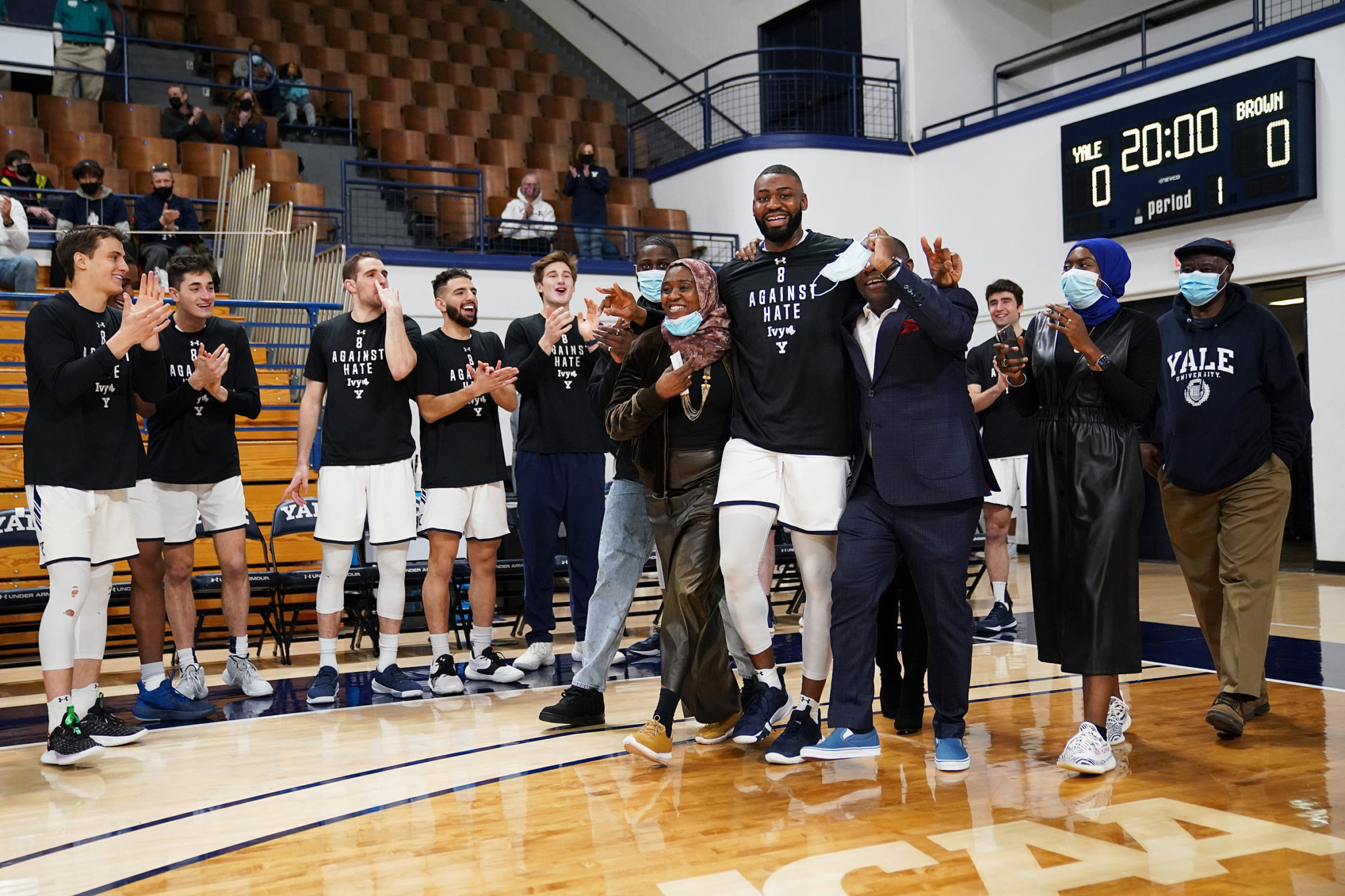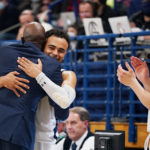MEN’S BASKETBALL: Senior Night caps an unexpected turn, new role for Jameel Alausa
Yale forward Jameel Alausa ’22 took a year off, gained 20 pounds of muscle and was ready for a bigger role during senior year: “I wanted to play so bad.” Double hip surgery forced him to reconsider how he could contribute during his final season.

Tim Tai, Staff Photographer
When Yale forward Jameel Alausa ’22 decided to take a yearlong leave of absence going into the 2020–21 school year, he was finishing up a summer of nephrology research in New Haven. He planned to go home to Chicago, study for the MCAT, tutor and take online classes through Washington University in St. Louis.
He was not planning on having hip surgery. But by the time 2021 began, Alausa had undergone two operations — one on each hip — with the first taking place in October 2020 and the second two months later in December.
Taking time off during an atypical pandemic school year was also a basketball decision; as a junior during the 2019–20 season, Alausa appeared in 24 games after playing nine as a sophomore and 15 during his first year. He felt he had “unfinished business to prove” and the potential to contribute in a larger role when Ivy League basketball returned.
“Before [the surgeries], I was working out every day, getting ready for a good season,” Alausa said. “It was [going to be] a good opportunity for me to come in as one of the older guys and know the system.” But recurring pain in his hips led Alausa to see a doctor, who told him that a genetic deformity and torn labrals meant that if he did not opt for an operation, he would probably need a hip replacement soon.
The double surgery and lingering soreness derailed plans for a big senior year on the court when Alausa returned to New Haven last fall. Instead, he had to learn how to contribute without logging any playing time. Entering last weekend, he had only played two minutes this season, both during Yale’s opener against Division III opponent Vassar. But Alausa stayed involved as a veteran voice within the program, bringing his high energy and optimistic spirit when he felt healthy enough to practice and taking on a mentorship role for the nine players on Yale’s roster who entered the season without any collegiate basketball experience.
“It was something I wrestled with a lot,” Alausa said in an interview before Yale’s Senior Night on Saturday against Brown. “If that’s where God’s directing me towards, where it’s not safe to play, I’m not going to overdo it … [but] I didn’t want to just not be doing anything. I didn’t want to just be a token guy.”
Senior Night, in some ways, was a celebration of his adopted role. Alausa estimated he had about 20 people — family, his fiancee, friends, cousins, old coaches — attend Yale’s win over Brown on Saturday night. Along with the Yale bench, they shot up when head coach James Jones checked Alausa into the game at the end of each half.

“I don’t think I’ve been happier to see someone check into the game than I was to see Jameel check in today,” captain and guard Jalen Gabbidon ’22 said. “That made my day.”
When Alausa had an early-year meeting with Jones last fall, he let his head coach know that he was not feeling fully recovered. At the time, Alausa was still planning on moving towards a fully restored physical state for the start of the season, but he came to realize he might not be able to consistently practice and compete over the course of a roughly five-month season. Last summer, more than six months after his second surgery, he was back to playing and competed in amateur leagues in Chicago. When the school year began, he was practicing every day in the preseason, but would be in pain for an hour or two after training.
His injury was unusual. Unlike other surgeries with standard recovery timelines, Alausa’s hips were less predictable. Some days he could practice in full. On others, he felt like he could not even get out of bed. He reevaluated with his surgeon — Benjamin Domb, a Princeton men’s basketball alumnus — and other doctors, who had him experiment with different routines but warned him that doing too much would continue to degrade the little cartilage he had left.
When Yale’s season opener against Vassar came in early November, Alausa was still trying to push his body.
“I wanted to play so bad,” Alausa said. “That was the biggest thing I wanted to do. That was my biggest goal coming into this year. But I think the biggest thing was the consistency playing every day … I [wasn’t] sure if I could practice seven, eight days in a row.”
Alausa approached Jones and recalled a “tough, torn” conversation where he had to reckon with his vision for senior year and the physical realities that were holding him back. His teammates reassured him that taking care of his long-term health was most important, but not being able to practice consistently and adjusting to his supporting role presented a mental battle for Alausa. He credited his family and fiancee for helping him come to terms with how his senior year would play out. Jones told him the program, and particularly Yale’s younger players, still needed him.

Alausa also recalled a conversation he had with his teammate’s dad, LaWan Swain, the father of guard Azar Swain ’22.
“Whatever you do, he basically just communicated to me that I brought more than what I can do on the court,” Alausa said of their conversation, which helped him accept his less than ideal situation. “He said the guys actually gravitate towards you and you can have a role and impact on the younger guys … if you can still be with the guys and have a role and impact them and use your spirit and connection with the team to have a role, you won’t ever regret it.”
On Saturday, Yale’s 74–65 win over Brown cemented an 11–3 Ivy League record for the Bulldogs, who finished second in the Ancient Eight and will take on No. 3 Penn in the conference tournament semifinal this Saturday. The year started with ups and downs, spurts of strong play followed by subpar performances. Yale did not string together consecutive wins against Division I opponents during its nonconference schedule. “We’re not playing as good as the sum of our parts,” guard Eze Dike ’22 concluded after a mid-December loss to Monmouth.
Alausa said he thought Yale could have splintered going into Ivy League play, but the team responded, winning nine of its first 10 conference matchups. Alausa said witnessing that collective growth has been meaningful. Knowing he might have played a small role bringing it about is what he will take from this unexpected senior-year experience.
Reserved off the court, Alausa adds a motivational bite to practices. Jones said he is always pushing for the reserves to beat the starters in practice, trash talking with a positive attitude.

“I’ve been coaching for 30 some odd years, I don’t even know what the number is, and there’s nobody that I’ve wanted to see be more successful than I’ve wanted to see Jameel be successful,” Jones said. “He works as hard as anybody I’ve ever coached, and he wanted it as much as anybody I’ve ever coached … He gave us as much as he could, and we’re thankful that he did.”
A pre-med student and an economics major, Alausa also thought his revised position this season affirmed one of his ultimate goals: becoming a physician. He saw parallels between his role with the program and what doctors fundamentally do — helping people get better. He found himself
talking to teammates about their health, both physical and mental, as the season went on.
“As a doctor, you have to be very selfless, you have to be more so focused on a group and people getting better, your patients,” Alausa said. “Because usually, when I was healthy, I would just be focused on how can I be better, but now I’m thinking how can the team be better.”
Alausa volunteers in orthopedic and neurology emergency care at Yale New Haven Hospital, a position he started on Monday, along with a student-run primary care center called HAVEN Free Clinic and at a hospice center called VITAS.








